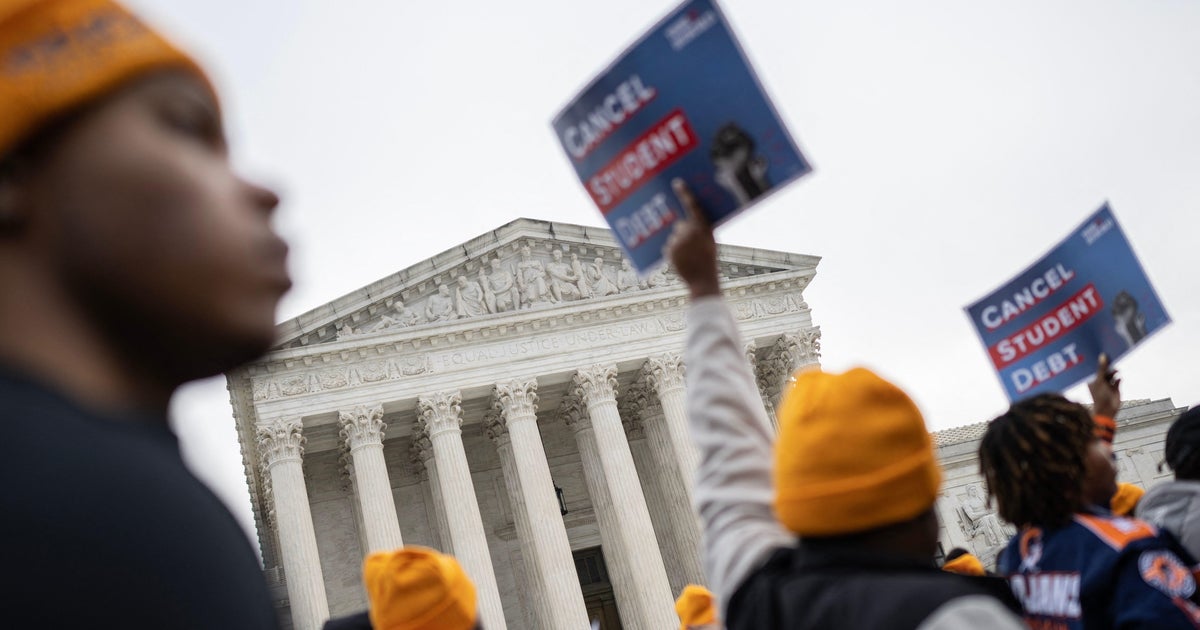Listen Live: Supreme Court weighs future of Biden’s student loan forgiveness program

Washington — The Supreme Court is hearing arguments Tuesday in a pair of cases involving President Biden’s plan to cancel up to $20,000 in student loan debt for millions of Americans, as a constitutional and political showdown over the future of the program arrives before the justices.
Though a decision from the court, with a 6-3 conservative majority, isn’t expected until this summer, the outcome will affect roughly 40 million borrowers who are eligible for the relief that President Biden announced last August, 20 million of whom stand to have their loan balances eliminated altogether, according to White House estimates.
The debt forgiveness initiative fulfilled a major campaign promise from the president, who faced pressure from some congressional Democrats and activists to take action to help the 43 million borrowers feeling the economic strains of the COVID-19 pandemic. Outside the court before the start of arguments, advocacy organizations gathered to rally in support of the program.
Under the plan, eligible borrowers earning less than $125,000 can receive up to $10,000 in student debt relief, and qualifying Pell Grant recipients, who are students with the greatest financial need, can have up to an additional $10,000 forgiven.
Mr. Biden’s student loan forgiveness program would wipe out $430 billion in student debt, but it was met swiftly by legal challenges from a group of six states — Arkansas, Iowa, Kansas, Missouri, Kentucky and South Carolina — and two borrowers from Texas, who separately argued the plan exceeds the administration’s authority.
ANDREW CABALLERO-REYNOLDS/AFP via Getty Images
The justices will consider two questions when they convene for arguments: whether the states and borrowers have the legal right (or “standing”) to challenge the program, and whether the Biden administration exceeded its authority with its debt relief plan.
In the case brought by the six states, a federal district court in St. Louis dismissed the case for lack of standing. But a federal appeals court blocked the debt relief program, finding that “Missouri is harmed from the financial losses that the cancellation inflicts.”
The appeals court focused its decision on the Higher Education Loan Authority of the State of Missouri, or MOHELA, a state-created entity that services federal student loans, finding that the financial impact on the loan servicer due to the debt discharge threatened financial harm to Missouri.
For the second case from Texas brought by borrowers Myra Brown and Alexander Taylor, a federal district court found the borrowers satisfied the requirements for standing and ruled the plan is an unconstitutional exercise of Congress’s legislative power. A federal appeals court declined to reinstate the program.
Brown does not qualify for debt relief, as her loans are held by commercial entities, and Taylor is eligible for $10,000 in loan forgiveness.
The Biden administration has argued in court papers that neither the states nor the borrowers have legal standing to challenge the debt relief program. Any harm to the states’ treasuries is “self-inflicted” and their theory of decreased tax revenues “unduly speculative,” according to Solicitor General Elizabeth Prelogar, who will argue on behalf of the Department of Education. With regards to Missouri and MOHELA, the two are “legally separate entities,” she said.
But Missouri argues the student debt relief program will inflict “substantial financial losses” on MOHELA and therefore injure the state, while the other states involved in the case claim they will lose tax revenues as a result of the program.
The states also argue the program is unlawful, as it was not authorized by the 2003 law the Biden administration said gives it the power to cancel student loan debt.
That law, the HEROES ACT, authorizes the education secretary to “waive or modify” student financial assistance programs for borrowers “in connection” with a war, military operation or national emergency, such as the pandemic.
Mr. Biden announced his student debt forgiveness plan last August, and in the less than four weeks that the application was available, more than 26.2 million people applied. Over 16 million of those applications were approved by the Department of Education, according to the White House. The Trump administration, followed by the Biden administration, paused federal student-loan payments during the COVID-19 pandemic, with the most recent extension running through June.
Share this news on your Fb,Twitter and Whatsapp
Times News Network:Latest News Headlines
Times News Network||Health||New York||USA News||Technology||World News
